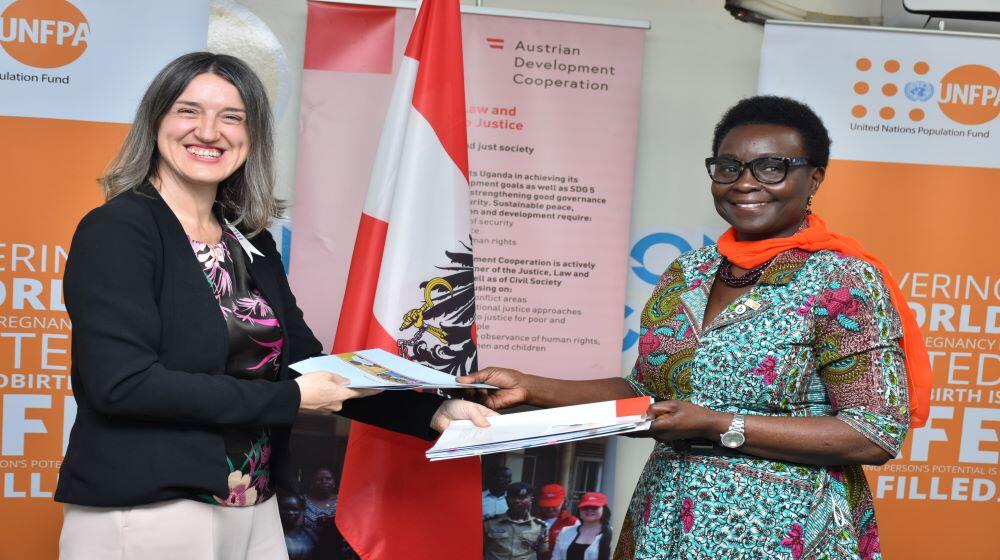KAMPALA, Uganda, 08 December, 2022: As a highlight under the ongoing 16 days of Activism against Gender Based Violence, the Head of Office Austrian Development Cooporation in Uganda (ADC) Dr Roswitha Kremser and the UNFPA Country Representative, Dr Mary Otieno have today signed an agreement totaling EUR 3,030,000 for increasing access to health services and justice for survivors of sexual and gender based violence in Karamoja and northern Uganda. The goal of the project is to increase utilization of Sexual and Reproductive Health and Rights (SRHR) and Gender Based Violence (GBV) services, as well as reduce GBV and other harmful practices in target districts.
The two-year project aims to ensure women and young people, including those in hard-to-reach communities and those most at risk, will be empowered to exercise their rights free from GBV and social norms, attitudes and behaviors that limit access to sexual and reproductive health and rights.
The project will also strengthen the capacity of national and sub-national institutions (justice, health and social protection institutions) and communities to provide and demand quality integrated sexual and reproductive health and GBV information and services without discrimination. Additionally, the project will contribute to timey access to justice for survivors of SGBV through special court sessions.
The project targets six districts in Karamoja region (Abim, Amudat, Moroto, Nakapiripirit, Kaabong and Napak) and three districts in Lango and Acholi region (two districts of Acholi (Omoro and Kitgum); and Otuke District in Lango sub-region). These regions continue to show a sustained high incidence of GBV, long distances to courts and other justice, law and order institutions, high case backlog, and weak GBV response services.
Although Uganda has made progress on achieveing gender equality, challenges still exist. Gender-based violence perpetuated against women and girls remains rife. The Annual Police Crime Report 2020 indicates a 29 per cent increase in GBV related crimes with 17,664 domestic violence cases reported to the police compared to 13,693 reported in 2019 of which 14,331 (81%) of the victims were females.
Tolerance for GBV, harmful practices, and lack of access to SRH information and services still dominate Karamoja and northern Uganda. This is coupled with inadequate justice services, social and gender norms stigmatizing service access and utilization and the institutions' limited capacity to deliver integrated GBV and SRHR services. Addressing the above issues will ensure that women and young people are empowered to exercise their rights free from GBV.
As part of the 16 days of activism on Violence Against Women and Girls, UNFPA and the Austrian Development Agency (ADA) are proud to support this initiative that aims to reduce GBV and enhance rights and choices for women and girls in hard-to-reach areas, while ensuring no one is left behind.
---ENDS—


